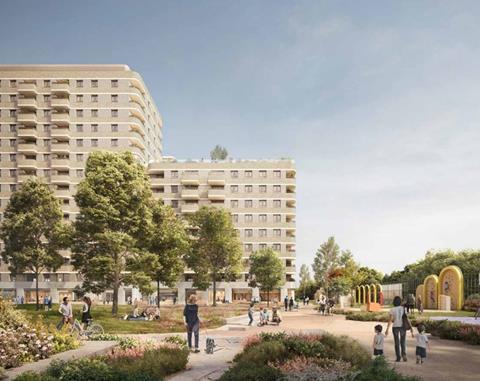Consultant predicts 2% tender price inflation in London this year
High-rise residential buildings currently in procurement in London could be delayed for as long as nine months after the introduction of the mandatory second staircase rule by the Greater London Authority.
The rule affects all new residential developments over 30m and while many affected are part of long programmes, allowing time for redesign, consultant Arcadis has said that in reality all projects currently in procurement will be postponed by six to nine months.

This week, housebuilder Hill announced it had taken four major residential schemes back to the drawing board due to second staircase requirements.
According to the consultant, the loss of workload associated with these delays is “a material factor influencing conditions in London”, with an anticipated reduction in tender price inflation to 2% in 2023.
Arcadis’ summer 2023 market view report said the widely forecast construction slowdown was accelerating, with housebuilding and commercial sectors hit particularly badly.
Construction new orders were down for a second quarter in a row, falling by £1.8bn, with order books in housebuilding and commercial slipping by 18.5% and 22.3% respectively.
The consultant predicted that infrastructure would see comparatively higher inflation, with rates running at more than double that of buildings, between 5% and 7%.
>> What the second staircase rule would mean for high-rise blocks
In-demand sectors such as energy, water and flood resilience will see greater inflationary pressure associated with specialist skills, plants and equipment, while cost pressures on road and rail jobs, where workloads are slowing, will be lower.
Simon Rawlinson, head of strategic research and insight at Arcadis, said: “Even if 2023 turns out to be better than forecast, we will see a significant slowdown compared to the past two years.
“Our view is that building workload will stabilise in 2024 at new but mostly reduced levels and that the greatest area of uncertainty will be the rate of growth of work to power and water networks.”
Sadiq Khan announced in February that high-rises over 30m in London would need a second staircase with “immediate effect.”
However there is also uncertainty over the details of what kind of staircase will be required and whether second lifts will also be needed. The government earlier this year consulted on a national ban on single staircases under 30m, with changes to building regulations expected later this year. Some developers, including Peabody, are waiting to see the detail of the national rules and how they work alongside Khan’s ban, before proceeding with designs.




























No comments yet